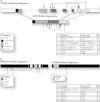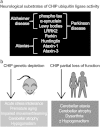Emerging evidence of coding mutations in the ubiquitin-proteasome system associated with cerebellar ataxias
- PMID: 27081508
- PMCID: PMC4785523
- DOI: 10.1038/hgv.2014.18
Emerging evidence of coding mutations in the ubiquitin-proteasome system associated with cerebellar ataxias
Abstract
Cerebellar ataxia (CA) is a disorder associated with impairments in balance, coordination, and gait caused by degeneration of the cerebellum. The mutations associated with CA affect functionally diverse genes; furthermore, the underlying genetic basis of a given CA is unknown in many patients. Exome sequencing has emerged as a cost-effective technology to discover novel genetic mutations, including autosomal recessive CA (ARCA). Five recent studies that describe how exome sequencing performed on a diverse pool of ARCA patients revealed 14 unique mutations in STUB1, a gene that encodes carboxy terminus of Hsp70-interacting protein (CHIP). CHIP mediates protein quality control through chaperone and ubiquitin ligase activities and is implicated in alleviating proteotoxicity in several neurodegenerative diseases. However, these recent studies linking STUB1 mutations to various forms of ataxia are the first indications that CHIP is directly involved in the progression of a human disease. Similar exome-sequencing studies have revealed novel mutations in ubiquitin-related proteins associated with CA and other neurological disorders. This review provides an overview of CA, describes the benefits and limitations of exome sequencing, outlines newly discovered STUB1 mutations, and theorizes on how CHIP and other ubiquitin-related proteins function to prevent neurological deterioration.
Figures


References
Publication types
Grants and funding
LinkOut - more resources
Full Text Sources
Other Literature Sources

